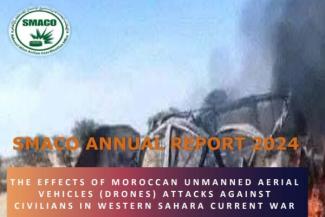
Shaheed El-Hafed, 27 May 2024 (SPS) - The Sahrawi Mine Action Coordination Office (SMACO) released its annual report for 2024, shedding light on the dire circumstances surrounding Moroccan use of Drones to assassinate civilians in Western Sahara amidst escalating conflict between Moroccan forces of occupation and Sahrawi liberation army.
Western Sahara remains heavily contaminated with landmines and explosive remnants of war, a legacy of the armed conflict between the Moroccan Army of occupation and the Polisario Front’s Liberation Army from 1975 to 1991. The presence of these hazards poses threats to the lives of local populations, UN personnel, and humanitarian workers. Compounded by extreme poverty and harsh environmental conditions.
Emergence of Drone Warfare
The conflict escalated in 2020 following Moroccan army’s attack on peaceful protesters in the Guerguarat region (South-west Western Sahara at the borders with Mauritania), prompting a declaration of resumption of armed struggle by the Polisario Front against the Moroccan illegal occupation.
Advanced military drones, supplied by Israel, Turkey, and China, have been deployed by the Moroccan army in this new phase of Moroccan expansionist war, resulting in a surge of civilian casualties. These attacks target not only individuals but also infrastructure and gold mining sites, exacerbating societal disruption and economic hardship.
Alarming Civilian Toll
SMACO’s annual report highlights 73 Moroccan drone attacks on civilians between 2021 and 2023, resulting in 160 civilian victims, including 80 fatalities. The indiscriminate nature of these attacks has led to severe injuries and fatalities among Sahrawi, Mauritanian, and Algerian nationals, all of them are civilians. Furthermore, the utilization of dangerous thermobaric weapons has exacerbated the humanitarian crisis, displacing populations and disrupting livelihoods.
International Implications
Morocco’s acquisition of sophisticated drone technology, facilitated by diplomatic normalization with Israel and support from some Arab countries, has intensified the conflict dynamics in North Africa. The report emphasizes the need for international intervention to address civilian casualties, demand accountability from involved parties, and ensure compliance with international humanitarian law.
Call to Action
In light of these findings, SMACO advocates for immediate cessation of civilian-targeted attacks, establishment of monitoring mechanisms, and provision of healthcare and support to victims and their families. It urges international organizations to conduct thorough investigations and hold perpetrators accountable, while calling upon the UN to prioritize the resolution of the Western Sahara conflict in accordance with the relevant international norms related to decolonisation.
Conclusion
As SMACO’s annual report reveals the harrowing realities faced by civilians in Western Sahara, it underscores the urgency for concerted efforts to mitigate the humanitarian crisis and address the root causes of the conflict, which remains a clear-cut issue of illegal occupation and an uncompleted process of decolonization that needs to be resolved.
With lives at stake and livelihoods threatened, the international community must heed the call for action to ensure peace, justice, and stability in the region.
About SMACO
The Sahrawi Mine Action Coordination Office (SMACO) was created by a Polisario Front presidential decree in 2013. It constitutes the national mine action centre, which is responsible for coordinating humanitarian mine action activities taking place east of the berm in accordance with International and Local Mine Action Standards. The organization participates in the planning, implementation, follow-up and reporting of all mine action activities (including clearance, risk education and victim assistance) conducted by the different NGOs and international contractors operating east of the berm.
In addition, SMACO is the national point of contact for the reporting of all mine/ERW related accidents as well as for the collection, coordination and the dissemination of this information for the same movement of persons through Western Sahara east of the berm. The SMACO’s office is located in Rabouni (Algeria), along with other official national organizations as well as local and international NGOs.
Source: Embassy to Ethiopia & Permanent Representation to the African Union